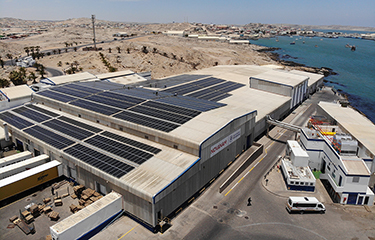Luderitz, Namibia-based seafood company NovaNam, a subsidiary of Nueva Pescanova Group, has commissioned a NAD 36 million (USD 2.4 million, EUR 2.1 million) solar photovoltaic project at its hake-processing factories in Luderitz and Walvis Bay.
The renewable energy project, which will generate 317,000 kilowatts per month, is part of a bigger plan by NovaNam’s parent company, Pontevedra, Spain-based Nueva Pescanova Group, to ensure sustainable management of resources through the use of green energy sources at its fish-processing facilities in both Spain and Namibia.
The Namibian solar project was initiated in 2019 when NovaNam announced the development of two solar farms at the Luderitz and Walvis Bay areas, The Namibian reported.
NovaNam Managing Director Edwin Kamatoto said the solar plant will reduce the company’s annual carbon dioxide emissions by 3.932 metric tons (MT).
He said the renewable energy project would boost the value-addition at the hake-processing facilities at both Luderitz and Walvis Bay, where an estimated 2,300 employees work to process 100 tons of fish daily.
Nueva Pescanova Group, which has diverse seafood oeprations including fishing, farming, processing, and marketing of fresh, refrigerated, and frozen seafood products, has been implementing an energy-transition plan to convert all its fish processing facilities to renewable energy sources.
The energy transition “is a significant step forward in our commitment to keep working for the environment and the sustainable management of natural resources,” Nueva Pescanova Group CEO Ignacio González said in a release.
Pescanova said more than 50 percent of its factories, including those operated by NovaNam in Namibia, now have clean energy sources. The commissioning of the Luderitz and Walvis Bay solar plants is a major boost to the Spanish Group’s drive to achieve 100 percent clean energy at all its fish-processing establishments, it said.
Currently, Pescanova has a total of approximately 42,000 square meters of photovoltaic modules in nine of its factories located in Spain and Namibia, which will generate energy for self-consumption of over 12.4 million kilowatt-hours per year. According to a release from the company, the energy produced is equivalent to the consumption of 3,330 homes in Spain and represents a carbon reduction equivalent to planting more than 227,000 trees.
Kamatoto said the Namibian renewable energy investment is part of NovaNam’s commitment to both use cleaner energy and help free up other energy sources in order to help meet developmental and infrastructural goals in Namibia. He said by embracing solar energy to power hake processing factories in Namibia, the company is supporting the country's effort to become a bigger player in renewable energy to meet the United Nations Sustainable Development Goal 7 - "Ensuring access to affordable, reliable, sustainable and modern energy for all."
Photo courtesy of Nueva Pescanova







